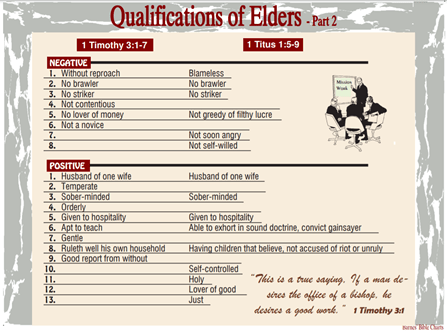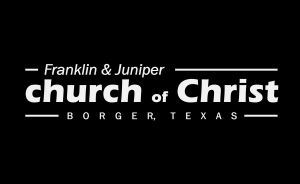
Dear Friend, (continued 2o3)
The church is to be subject to Christ in all things (Ephesians 5:23,24). Jesus is the head of the church (Colossians 1:18; Ephesians 1:22,23), not any representative on earth. The church that belongs to Christ requires a “thus saith the Lord,” a scriptural reason for everything that it says and does (2 Timothy 3:16,17; 1Peter 4:11; 2 John 9; Revelation 22:18,19). The church cannot go beyond that which is written. If a man teaches something other than the truth he is to be cut off from the church (Galatians 1:6-10; 2 John 9-11). That means the church will do what Christ has authorized; no more, no less (Colossians 3:17; Acts 4:7). There must be a “thus saith the Lord” before the church can act. As the army of Christ, composed of soldiers of Christ, it cannot advance unless given the command of Christ.
The commands of Christ are found in the New Testament, Jesus took the Old Testament out of the way, nailing it to the cross (Colossians 2:12-14; Ephesians 2:14-17; Galatians 3:1-5, 17-29; 4:21-5:5; Hebrews 8:1-28; 12:18-29; 13:11-12; 2 Corinthians 3:1-18). We are not under the Old Testament, for Christ is become of no effect unto you, whosoever of you are justified by the law; ye are fallen from grace (Galatians 5:4).
The conditions for pardon and fellowship are given in the New Testament. Those who receive pardon and are accepted into the fellowship of the church are:
- those who, having HEARD the word of God, and have FAITH (Romans 10:17; Hebrews 11:1,6);
- those whose faith causes them to REPENT (Acts 17:30; 2Peter 3:9);
- those who CONFESS their faith in Jesus as the Son of God (Acts 8:36,37; Romans 10:9,10; Matthew 10:32,33);
- those who are IMMERSED in water in order to obtain the remission of sins (Mark 16:16; Acts 2:38; 22:16; Galatians 3:26,27; 1Peter 3:21);
- those who REMAIN FAITHFUL in obedience, for those who walk disorderly are rejected John 15:1-6; 2Peter 2:20-22; Revelation 3:15,16). Any other conditions are commandments and doctrines of men.
The church is subject to Christ in organization. There is no organization revealed in God’s Word larger than the local congregation. The local congregation is to have a plurality of men who watch over that congregation who are known as elders, overseers, bishops, and pastors (Acts 14:23; 20:17,28; Titus 1:5-7; Ephesians 4:11). This is not one individual, but a group of individuals. These men must meet all of the qualifications set forth to serve (1Timothy 3:1-7; Titus 1:5-9). There is no record of a singular pastor over a congregation. The local congregation also has deacons who meet the qualifications (Philippians 1:1; Acts 6:1-6; 1 Timothy 3:8-13).
The local congregation also has preachers, or evangelists (Acts 21:8; 2Timothy 4:1-5). The church no longer has living apostles or prophets (Acts 1:21-26; Ephesians 2:20). There is no separation of clergy and laity, for all are priests unto God (1Peter 2:5,9). A congregation can exist without elders, deacons or a preacher. But no man has the right to assume the eldership without the correct credentials. We cannot make up our own government for the church.
The church is to be subject to Christ in its worship. The local church meets together in one place upon the first day of the week, every week, and partakes of the unleavened bread and the fruit of the vine in the Lord’s Supper (Acts 20:7; Matthew 26:26-30; 1Corinthians 11:17-34). The church as it gathers together sings without instrumental music nor specialized singers (Ephesians 5:19; Colossians 3:16). The worship also includes prayer (Acts 2:42; 12:5), preaching (Acts 20:7), and a free will contribution (1Corinthians 16:1-2; 2 Corinthians 9:6,7). During the assembly the women are to keep silence (1Corinthians 14:34,35; 1Timothy 2:11-15).
- Friend, do the “churches” that you are attending realize and teach that the church is the saved, and since it is that which Christ shed his blood for, and is the Savior of, you must be a part of the church to be saved?
- Do the “churches” that you are attending teach and practice that Christ is the head of the church, rejecting all creeds and councils for the church, and accepting the New Testament as their only creed book?
- Friend, Do the “churches” that you attend justify their actions from the Old Testament? or do they abide by the doctrine of Christ?
- Do the “churches” you attend teach and practice the conditions of pardon and fellowship that the apostles revealed by inspiration, or do they have other conditions?
- Friend, do the “churches” you attend have the organization found in the New Testament? or do they have a state, regional and/or national organization?
- Do the “churches” you attend follow the New Testament plan for worship in partaking of the Lord’s Supper every week, having congregational singing without instrumental music, praying, preaching the word, and having a free-will contribution?
Ask the preachers if they have a creed book. Ask them if they have a ruling council. Ask the preachers if they justify their actions by the Old Testament. Ask them what it takes to become a member of their denomination. Are the answers to these questions the answers which are given in the New Testament? Are they the church you read about in the New Testament?
(continued next week)
